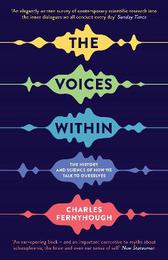
|
The Voices Within: The History and Science of How We Talk to Ourselves
Paperback / softback
Main Details
| Title |
The Voices Within: The History and Science of How We Talk to Ourselves
|
| Authors and Contributors |
By (author) Charles Fernyhough
|
| Physical Properties |
| Format:Paperback / softback | | Pages:352 | | Dimensions(mm): Height 200,Width 130 |
|
| Category/Genre | Popular science
Popular psychology |
|---|
| ISBN/Barcode |
9781781252802
|
| Classifications | Dewey:153.4 |
|---|
| Audience | | General | | Tertiary Education (US: College) | | Professional & Vocational | |
|---|
| Edition |
Main
|
|
Publishing Details |
| Publisher |
Profile Books Ltd
|
| Imprint |
Wellcome Collection
|
| Publication Date |
20 April 2017 |
| Publication Country |
United Kingdom
|
Description
We all hear voices. Ordinary thinking is often a kind of conversation, filling our heads with speech: the voices of reason, of memory, of self-encouragement and rebuke, the inner dialogue that helps us with tough decisions or complicated problems. For others - voice-hearers, trauma-sufferers and prophets - the voices seem to come from outside: friendly voices, malicious ones, the voice of God or the Devil, the muses of art and literature. In The Voices Within, Royal Society Prize shortlisted psychologist Charles Fernyhough draws on extensive original research and a wealth of cultural touchpoints to reveal the workings of our inner voices, and how those voices link to creativity and development. From Virginia Woolf to the modern Hearing Voices Movement, Fernyhough also transforms our understanding of voice-hearers past and present. Building on the latest theories, including the new 'dialogic thinking' model, and employing state-of-the-art neuroimaging and other ground-breaking research techniques, Fernyhough has written an authoritative and engaging guide to the voices in our heads.
Author Biography
Charles Fernyhough is the author of Pieces of Light (Profile Books) and The Baby in the Mirror (Granta), two novels, The Auctioneer (Fourth Estate) and A Box of Birds (Unbound), and has contributed to the Guardian, TIME Ideas, Sunday Telegraph, Financial Times, Sydney Morning Herald, and Focus Magazine. He has published many scientific articles on the relation between language and thought, and his ideas on thinking as a dialogue with the self have been influential in several fields. He is a part-time Professor in Psychology at Durham University, where he directs Hearing the Voice, a project on inner voices funded by the Wellcome Trust.
ReviewsFascinating and elegantly humane ... refreshingly interdisciplinary in its insistence that philosophy and literature are going to be just as important investigative tools for this subject as clinical psychology * Guardian * Compelling ... it does reassure those of us who worry that we have a chorus of voices jabbering in our heads. It turns out we're not mad, or even odd, but simply lucky enough to have a second - or thirdm or fourth - opinion always on call to help. -- Kathryn Hughes * Mail on Sunday * An elegantly written survey of contemporary scientific research into the inner dialogues we all conduct every day ... persuasively unravels connections between the voices we hear inside and the words we say out loud, and shows that the conversations we have with ourselves can be as interesting and revealing as those we have with others. * Sunday Times * An ear-opening book - and an important corrective to myths about schizophrenia, the brain and even our self of sense * New Statesman * Profound and eloquent ... an intriguing array of fresh findings and perspectives [which] makes a persuasive case that one of the most intimate and private of our mental activities has a social origin. We talk to ourselves because we talked to others first. * Nature * Intriguing -- Salley Vickers * Observer * Throughout Charles Fernyhough's fascinating tour d'horizon he collapses many similar oppositions: between data and feelings, speaking and listening, external reality and our inner lives. These perspectives may not all resolve into a single viewpoint, but like the voices that constitute our thoughts, they are brought into stimulating and fruitful conversation. -- Mike Jay * Literary Review *
|